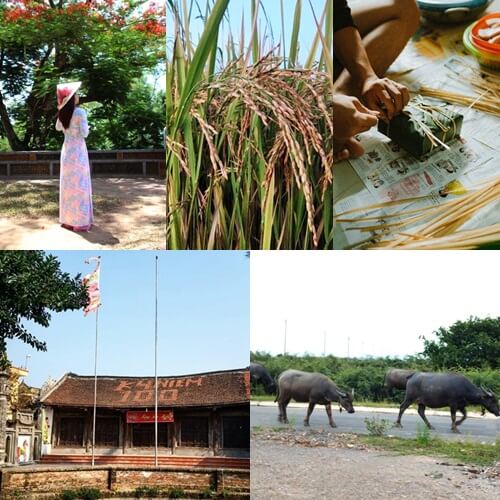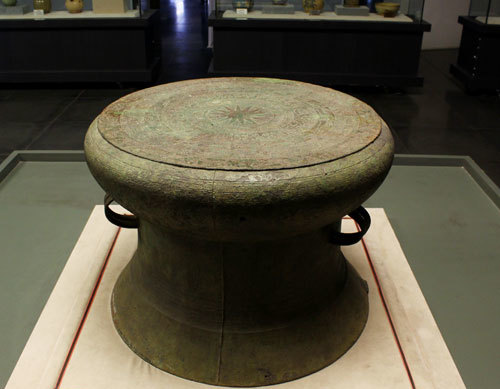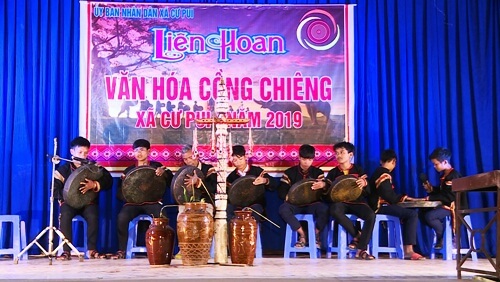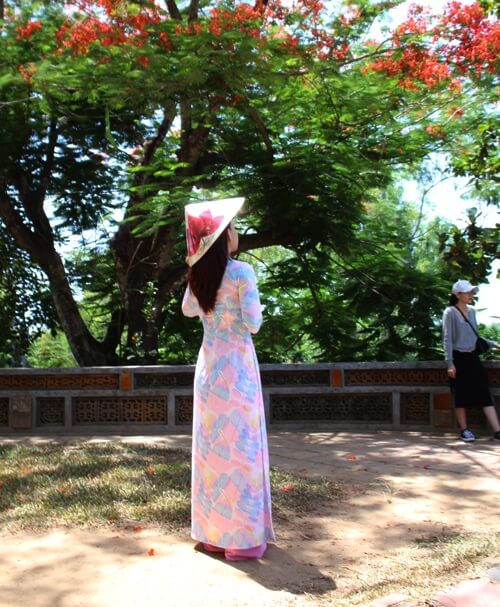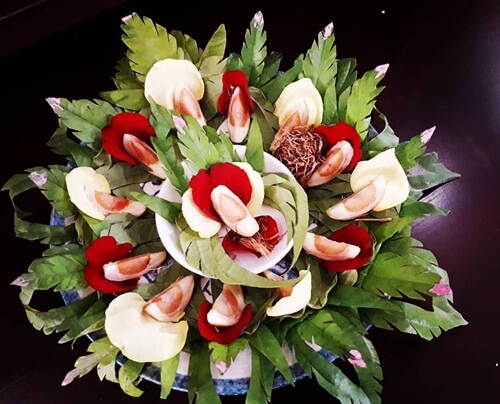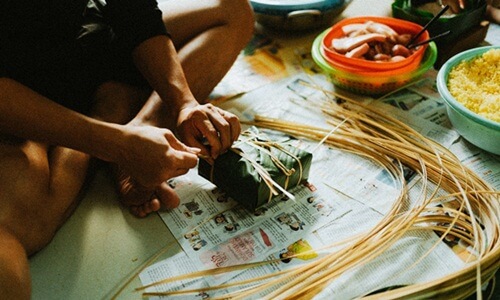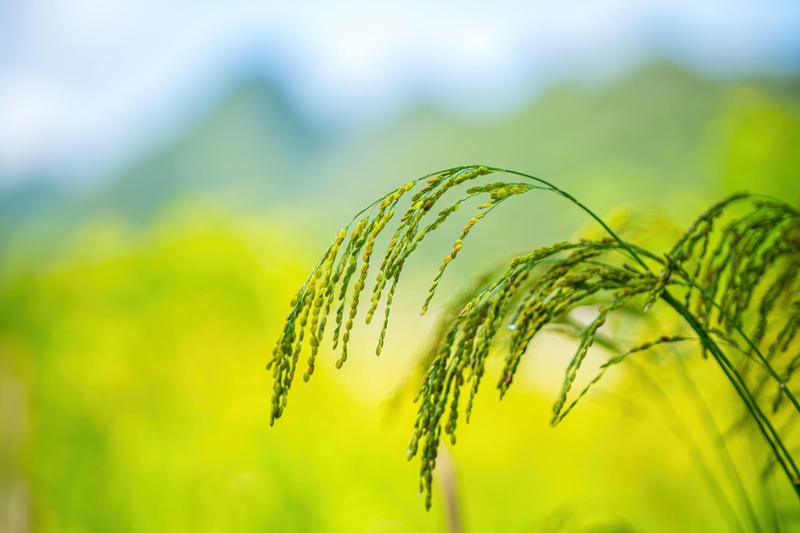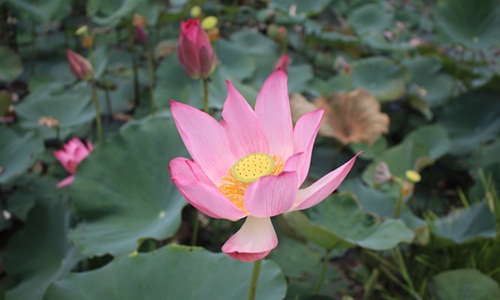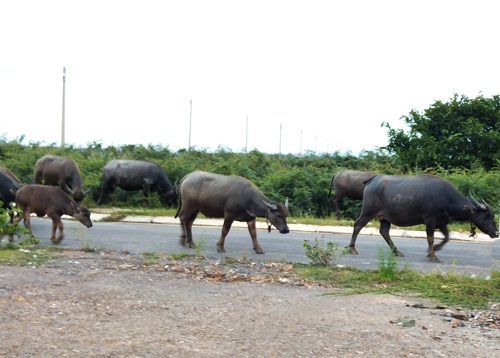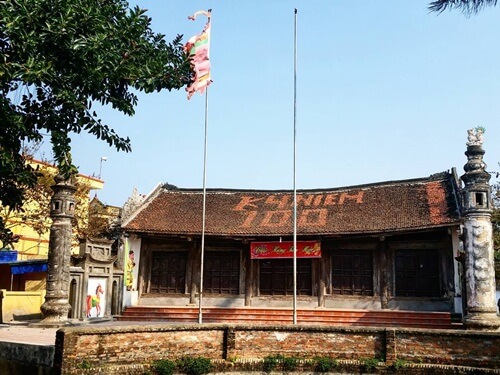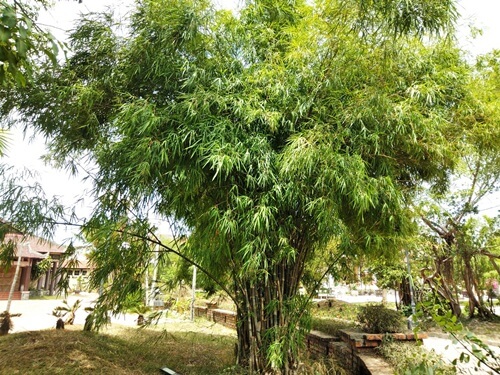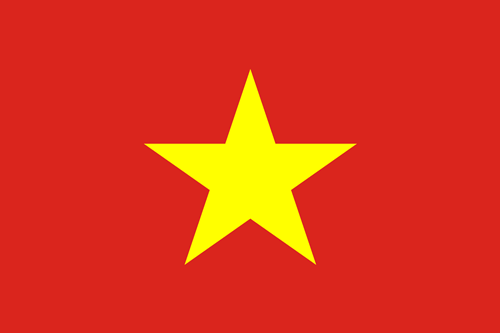We researched and collected information about the symbols of Vietnam to have a universal view of the culture.
In particular, we have selected and grouped into 10 main symbolic objects and explained their meanings.
Now, let’s take a closer look together!
1. Bronze drums and gongs
Copper drums and gongs both function as traditional musical instruments and hold significant spiritual strength.
The sound of drums and gongs can be seen as a signal of solidarity, community, and national strength. These images appear on important occasions, such as festivals, Tet holidays, and vital rituals.
Although today bronze drums are no longer used much in life, the spiritual values and images on ancient copper drums show the unique beauty and strength of the Vietnamese people. Many beautiful antique drums are displayed in various Vietnamese museums, especially the Hanoi National Museum.
Also, gongs are still kept and used in the lives of ethnic minorities, especially in the Central Highlands. If you visit the sunny and windy land, you will enjoy the cheerful sound of gongs.
2. Ao Dai
Over thousands of years of culture and history, the image of the Ao Dai has more or less changed, but the basic traditional lines are still preserved.
Although Ao Dai is not only for women but also for men, almost everyone immediately thinks of the gentle, slender, and elegant beauty of Vietnamese women when mentioning it. Perhaps this dress is more suitable for women, who often wear such styles more than men.
The image of Ao Dai shows the unique and graceful beauty of the person wearing it. Therefore, this long dress is present at most important events, festivals, schools, and hotels. Typically, over time, these clothes have been chosen as the national costume of Vietnam and are the pride of the Vietnamese people.
You will see a lot of high school girl students having to wear Ao Dai on certain days, and in essential ceremonies, Vietnamese women often have to wear it because it is the pride of their beauty. Also, it is responsible for preserving the culture through the dressing way.
3. Betel leaves, areca nut, and lime
Derived from “The legend of betel nut and areca”, the Vietnamese have conventionalized the image of betel leaves – areca nuts – lime to express the close affection of brothers and wife-husband in the family.
These images appear in ancestral worship, traditional festivals in Vietnam, temples, and weddings.
The custom of eating betel nuts for teeth to become black, making the breath more fragrant, is no longer as common as it used to be. However, sometimes, you will come across the elders who still like to chew betel nuts as a habit.
Although not common in real life, with the spiritual culture, the symbol Betel – Areca – Lime is also seen as hospitality when inviting typical guests to start a meeting.
Therefore, it can be said that the signs of Betel-Areca-Lime have become a symbol in cultural life that has existed for many generations, associated with important events in people’s daily lives.
4. Banh chung and banh day
In the emblem of Vietnam, it is impossible to ignore Banh Chung and Banh Day. These images also come from a story of the same name that speaks of agricultural culture. Also, they relate to the custom of worshiping and being grateful to ancestors during the days of the Lunar New Year.
Therefore, everyone prepares Banh Chung and Banh Day for spiritual beauty during the Vietnamese New Year.
As Vietnamese, almost every time people mention Banh Chung, people immediately think of Tet, and when it comes to Tet, it is indispensable for these cakes.
If you can join the traditional festivals in Vietnam, especially the Hung Temple festival on the 10th day of the 3rd lunar month, you will see the process of making Banh Chung and Banh Day. Also, people organize the ceremonies to offer these cakes to the King to worship in solemn respects.
5. Lotus and rice plants
The lotus flowers and the rice plants are two symbolic images with different meanings in Vietnam. However, they have one thing in common: they originate from an agricultural culture and are associated with water, fields, and swamps.
Besides the material meaning of being the major food in family meals in Vietnam, rice is processed into cultural foods, such as Banh Chung, Banh Day, and Pho. Rice becomes an image of conquering nature and swamps to serve human life.
The lotus is one of the beautiful Vietnamese flowers, which is the expression of reaching out from hardships and escaping the limits of life. From the swamp, the lotus flower is still fragrant. With the meaning of longing to live, the lotus has been chosen as the national flower of Vietnam.
The image of a golden lotus on the famous airline Vietnam Airlines also partly proves a beautiful symbol of Vietnam.
6. Water buffalo
The image of the buffalo associated with the farmer has become a friendly symbol in Vietnam with the meaning of diligence, going along with the development of a country going up from agriculture.
In the belief of feng shui, the buffalo is also one of the 12 animals for counting the lunar calendar in Vietnam. The gentle personality of this animal has the same meaning as the honest and straightforward character of the farmers in Vietnam. Thus, the buffalo can be seen as a close friend of many people.
Although life has developed and many places no longer use buffalo for labor, its familiar image has entered the subconscious mind of most Vietnamese people. Also, it is considered a Vietnamese symbol of tireless labor, looking forward to a bright tomorrow.
7. Banyan tree, water wharf, communal house
The group of emblems of a banyan tree, the water wharf, and the communal house often go together. They are associated with the image of ancient villages in Vietnam with peaceful beauty, a familiar sign of all rural people.
The banyan tree is often at the beginning of the village, where workers and travelers rest after hours of hard work or travel long distances.
The wharf, also known as a well in some places, is where all the villagers come to get water and wash, and even on moonlit nights, the girls and boys of the village meet.
The communal house is considered the place where the spiritual life of the villagers is preserved and promoted. The significant festivals gather both the elders and the young, and both boys and girls to join to wish together a prosperous, happy, and peaceful life.
All these symbols cannot be separated from the life of the rural people, becoming dear marks and features of community solidarity.
8. Bamboo tree
Bamboo occupies an important position in daily life as well as in spiritual culture and is considered one of the cultural Vietnamese symbols.
The bamboo has become one of the peaceful images of the Vietnamese countryside, coming together with the banyan tree, water wharf, and communal house.
In terms of cultural significance, the bamboo tree represents an indomitable spirit, not afraid of difficulties like the village bamboo ramparts that still stand on rainy and stormy days.
Bamboo often grows in bunches, so it is very sturdy, creating great strength to protect the village, which shows cohesion, community, and living together like the Vietnamese way of life.
In terms of application, bamboo has become a useful material for building houses, boats, bridges in Vietnam, containers, and chopsticks. Bamboo appears almost everywhere in life in Vietnam nowadays.
9. National flag of Vietnam
The Vietnamese flag has become a familiar image for every citizen. Every time seeing this sign, everyone feels peaceful and wishes for peace.
Since national independence in 1945, the flag with a red image and a yellow star in the middle has been officially recognized as the national flag of Vietnam.
The national flag is a sacred symbol of the nation, the spirit of the struggle for independence and defense, the strength of unity of all people, and the national unity of Vietnam.
This symbolic thing can be seen in almost every region and city in Vietnam. You can see it appearing on souvenirs and t-shirts, which you can buy as a gift during your holidays in Vietnam.
10. National emblem of Vietnam
If we refer to the national symbols in Vietnam, we cannot miss the emblem of this beautiful country (Quoc Huy), which was officially recognized in 1956.
This national emblem was drawn by a famous Vietnamese painter, Mr. Bui Trang Chuoc, who specialized in drawing stamps, money, national emblems, logos, etc. during the years from 1953 to 1955.
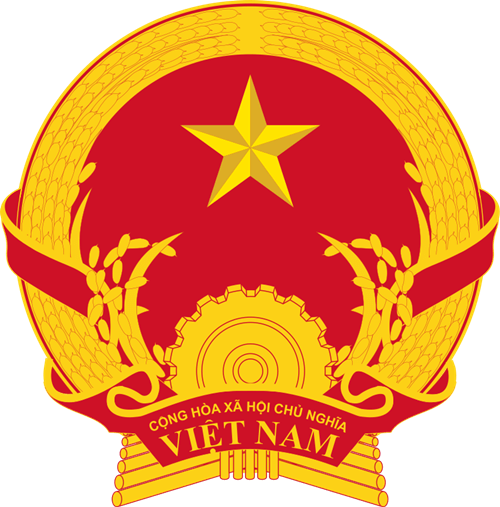
The images on the national emblem represent the spirit of independence and the identity of Vietnamese culture. Rice flowers symbolize agriculture, the wheel presents industry, the words “Socialist Republic of Vietnam” are the full name of Vietnam, and the image of a star and red background has the same meaning as the national flag.
Some symbols in Vietnam have been officially recognized and recorded in documents, such as the National Emblem, National Flag, and National Anthem. Meanwhile, most other symbols have not yet been officially authenticated.
But for Vietnamese people, all of the above are familiar images associated with both spiritual and real life. Therefore, most people see them as emblems for themselves and the local culture.
In addition to the images mentioned above, there are many other symbols in Vietnamese culture and life, such as the Temple of Literature, the Sword Lake, the Dragon, the Tortoise, etc. However, with the limitation of the article, we only mention prominent symbols.
Stay up-to-date on the latest news and insights in Vietnam by following @vietnamdrive on Twitter and @vietnamdrive on Instagram today!
